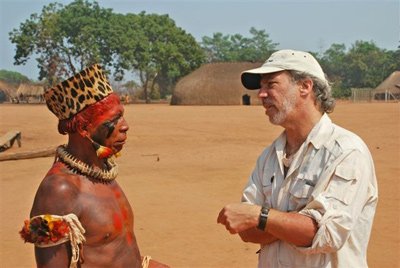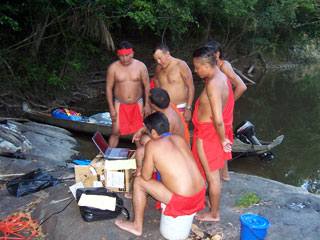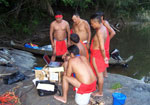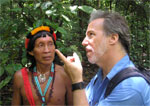Amazon Conservation Team wins “Innovation in Conservation Award” for path-breaking work with Amazon tribes
Amazon Conservation Team wins “Innovation in Conservation Award”
for path-breaking work with Amazon tribes
mongabay.com
December 11, 2007
The Amazon Conservation Team (ACT) [donate] was today awarded mongabay.com’s inaugural “Innovation in Conservation Award” for its path-breaking efforts to enable indigenous Amazonians to maintain ties to their history and cultural traditions while protecting their rainforest home from illegal loggers and miners.
“ACT is very pleased to win this award,” said Dr. Mark Plotkin, a renowned ethnobotanist, author, and founder of the Amazon Conservation Team. “It’s our strong belief that the people who best know, use, and protect biodiversity are the indigenous people who live in these forests. The best way to protect ancestral rainforests is to help the Indians hold on to their culture, and the best way to help them hold onto their culture is to help them protect the rainforest. And, the fact that it comes from Mongabay — which is employing 21st century technology to spread this story far and wide, and increasingly recognized as the ‘go-to’ rainforest site on the web — makes it all the more meaningful.”
 Dr. Mark Plotkin with Chief Atamai in the eastern Amazon. Image courtesy of ACT. |
ACT has won wide acclaim for its novel approach to conserving biodiversity, health, and culture in South American rainforests, one of the few places where many indigenous populations still live in mostly traditional ways. But as forests fall to loggers, miners, and farmers, and the allure of western culture attracts younger generations to cities, extensive knowledge of the forest ecosystem and the secrets of life-saving medicinal plants are forgotten. The combined loss of this knowledge and these forests irreplaceably impoverishes the world of cultural and biological diversity.
ACT is enabling Indians to monitor and protect their forest home while passing on their cultural wealth to future generations. ACT is working in partnership with local governments to train Indians in the use of GPS and the Internet to map and catalog their forest home, helping to better manage and protect ancestral rainforests by monitoring deforestation and preventing illegal incursions on their land. At the same time the efforts are strengthening cultural ties between indigenous youths and their parents and grandparents.
“This is the perfect combo of western technology and indigenous custom and know-how,” said Plotkin. “We’ve got guys painted red and nothing else, walking through the jungle with GPS units mapping their land. That’s the sweet spot, the best of both worlds.”
Native Amazonians are also using Google Earth to look for illegal encroachment.
 GPS data gathering on a mapping expedition in the Amazon. Image courtesy of ACT. |
“Google Earth is used primarily for vigilance,” Vasco van Roosmalen, ACT’s Brazil program director, said in an interview with mongabay.com. “Indians log on to Google Earth and study images, inch by inch, looking to see where new gold mines are popping up or where invasions are occurring. With the newly updated, high-resolution images of the region, they can see river discoloration which could be the product of sedimentation and pollution from a nearby mine. They are able to use these images to find the smallest gold mine.”
“The Amazon Conservation Team is doing ground-breaking work helping indigenous people in the Amazon protect their land and culture using a combination of cutting-edge technology and traditional knowledge of the forest,” said mongabay.com founder Rhett A. Butler. “I know that donations to ACT will go directly toward empowering indigenous Amazonians and protecting the world’s largest and most biodiverse rainforest, not mass-mailing requests for money or egregious spending on overhead.”
ACT was recently given a top rating (four stars) by Charity Navigator, which ranks not-for-profit organizations in terms of their effectiveness and efficiency.
Mongabay.com, a leading conservation and environmental science news site, is the world’s most popular destination for information on tropical rainforests with more than one million unique visitors per month, according to comScore. Mongabay.com’s “Innovation in Conservation Award” is given annually to an organization using an unconventional and highly effective approach to conserving rainforests and biodiversity.
Help ACT protect rainforests and indigenous culture in the Amazon
Earlier mongabay.com articles about ACT
 |
Amazon Indians use Google Earth, GPS to protect forest home
(11/14/2006) Deep in the most remote jungles of South America, Amazon Indians are using Google Earth, Global Positioning System (GPS) mapping, and other technologies to protect their fast-dwindling home. Tribes in Suriname, Brazil, and Colombia are combining their traditional knowledge of the rainforest with Western technology to conserve forests and maintain ties to their history and cultural traditions, which include profound knowledge of the forest ecosystem and medicinal plants. Helping them is the Amazon Conservation Team (ACT), a nonprofit organization working with indigenous people to conserve biodiversity, health, and culture in South American rainforests.
 |
Indians are key to rainforest conservation efforts says renowned ethnobotanist
(10/31/2006) Tropical rainforests house hundreds of thousands of species of plants, many of which hold promise for their compounds which can be used to ward off pests and fight human disease. No one understands the secrets of these plants better than indigenous shamans -medicine men and women – who have developed boundless knowledge of this library of flora for curing everything from foot rot to diabetes. But like the forests themselves, the knowledge of these botanical wizards is fast-disappearing due to deforestation and profound cultural transformation among younger generations. The combined loss of this knowledge and these forests irreplaceably impoverishes the world of cultural and biological diversity. Dr. Mark Plotkin, President of the non-profit Amazon Conservation Team, is working to stop this fate by partnering with indigenous people to conserve biodiversity, health, and culture in South American rainforests. Plotkin, a renowned ethnobotanist and accomplished author (Tales of a Shaman’s Apprentice, Medicine Quest) who was named one of Time Magazine’s environmental “Hero for the Planet,” has spent parts of the past 25 years living and working with shamans in Latin America. Through his experiences, Plotkin has concluded that conservation and the well-being of indigenous people are intrinsically linked — in forests inhabited by indigenous populations, you can’t have one without the other. Plotkin believes that existing conservation initiatives would be better-served by having more integration between indigenous populations and other forest preservation efforts.
Amazon rainforest children to get medicinal plant training from shamans
(11/21/2007) The Amazon Conservation Team (ACT) — a group using innovative approaches to preserving culture and improving health among Amazonian rainforest tribes — has been awarded a $100,000 grant from Nature’s Path, an organic cereal manufacturer. The funds will allow ACT to address one of the most pressing social concerns for Amazon forest dwellers by expanding its educational and cultural “Shamans and Apprentice” program for indigenous children in the region.
Google helps protect Amazon rainforest
(6/10/2007) Google is working with a indigenous tribe deep in the Amazon rainforest to protect their lands from illegal encroachment, reports the San Francisco Chronicle. For the first time, Google has confirmed details of the project. Working in conjuction with the Amazon Conservation Team, Google Earth’s technology is being used to monitor illegal mining and logging that threaten the lands of the Surui tribe in Brazil. Google is working with satellite providers to significantly improve image resolution in some of the most remote parts of the Amazon basin.
Ethnobotanist honored for contributions to wilderness medicine
(8/8/2007) Renowned ethnobotanist and conservationist Dr. Mark Plotkin of the Amazon Conservation Team was honored Wednesday with the 2007 Paul S. Auerbach Award, a distinction awarded by the Wilderness Medical Society (WMS).